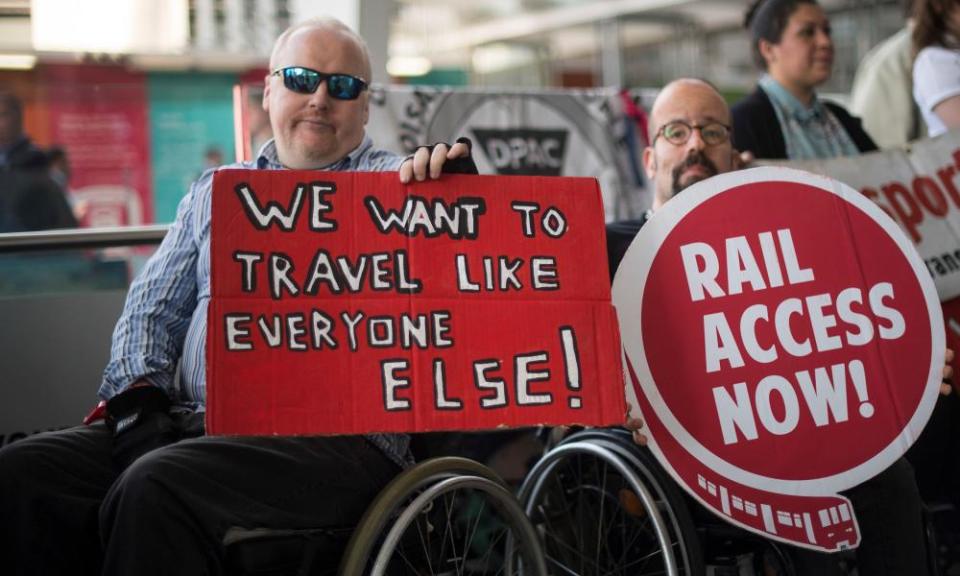Disabled rail passengers face restrictions at one in 10 stations

More than one in 10 railways stations in Britain do not allow disabled passengers to “turn up and go” on some or all train services, according to research by campaigners.
The accessibility problems are caused by a combination of “driver-only operation” (DOO) trains and unstaffed stations, which result in a lack of staff to help disabled passengers board their train. Some stations have no step-free access.
According to data compiled by the Association of British Commuters (ABC), a voluntary campaign group, six rail operators have staffing policies that mean disabled passengers cannot simply turn up and travel on certain services at nearly 300 stations, concentrated in London and the south-east. Instead, they have to pre-book what are often suburban rail journeys, wait for staff to arrive from another station to assist them, or give up on travelling from that station.
“When there is no staff presence, the option of spontaneous access on an equal basis with others is just literally not there, it cannot happen,” said ABC’s Emily Yates, lead researcher on the project.
“The mobile staffing that they offer as a replacement has no maximum wait time, and no projected wait time or reassurance. In fact, the accessible transport policies even say: ‘Don’t travel without pre-booking, we strongly discourage this, you’ll be subject to a long wait time’.”
ABC defined “turn up and go” as being where staff are present to allow disabled passengers who have just arrived at the station to board their train. Based on this, only one of 25 stations served by rail firm c2c always offers turn-up-and-go travel to disabled passengers, and only 10 of 35 stations served by Chiltern Railways.
In addition, ABC said turn-up-and-go assistance is not always available – and in some cases never available – at 45% of stations served by Govia Thameslink Railway (GTR), 38% of stations served by Southeastern, 32% of stations served by Greater Anglia and 16% of those served by Great Western Railway.
The industrial dispute involving the National Union of Rail, Maritime and Transport Workers (RMT) includes disagreements over rail firms’ plans to increase the use of DOO trains and close ticket offices.
“The discrimination that I’ve faced since becoming a wheelchair user is night and day, and it is constant every time I go anywhere or do anything,” said Sam Jennings, who secured compensation and commitments on access from Govia-owned rail operator Southern after enduring months of discrimination on its services. “I realised [the wheelchair] had given me my freedom back – and then I became disabled by the railway.”
Related: Disabled passengers bearing brunt of travel disruption, say charities
Jennings encountered more than 30 “access fails” on the rail network in the first 18 months of using a wheelchair, including unstaffed stations meaning she couldn’t board, staff not using ramps to help her board, getting put on the wrong train by staff, and being left stranded at stations with no step-free exits.
The six rail providers told the Observer that their accessibility arrangements had been approved by the regulator, the Office of Rail and Road, which requires them to provide “reasonably practicable” assistance to disabled passengers.
The six providers said they could deploy mobile staffing teams, or redeploy staff from a nearby station, to assist a passenger at an unstaffed station. GTR, c2c and Southeastern said ABC’s figures on staffing hours were wrong, but did not provide the Observer with correct figures of their own.
A spokesperson for the Department for Transport said: “Everyone should be able to travel with confidence, and the safety of passengers will always be our top priority.
“We want to modernise the railway by moving staff on to platforms to provide more face-to-face assistance, and our Passenger Assist app is ensuring those with disabilities receive assistance quicker than ever.”

 Yahoo Movies
Yahoo Movies 